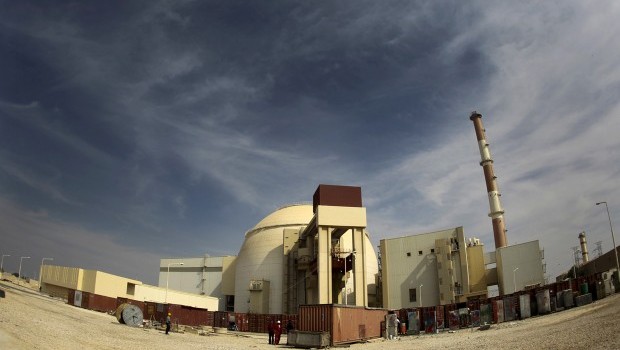
A general view of the Bushehr nuclear power plant, only 85 kilometers from the earthquakes epicentre. Source: Reuters/Mohammad Babaie
London, Asharq Al-Awsat—It is too early to say whether the Iran-P5+1 talks would make progress in resolving the decade-long standoff over Tehran’s nuclear program, Iranian Deputy Foreign Minister Abbas Araqchi said on Tuesday.
Speaking at the end of the first day of talks in Geneva, he told Reuters: “They went well. We had very constructive, very good exchange of views, very serious. It was, I can say, very businesslike.”
Iranian negotiators had put forward a proposal that has the “capacity to make a breakthrough” on the first day of vital talks between Tehran and the five permanent UN Security Council members and Germany on Tuesday.
Iranian Deputy Foreign Minister Abbas Araqchi said the plan’s official name was “An End to the Unnecessary Crisis and a Beginning for Fresh Horizons,” adding that Iran no longer wants to “walk in the dark.”
The plan would see crushing international sanctions on Iran lifted in exchange for concessions it had previously been unwilling to consider, including increased monitoring and scaling back of uranium enrichment.
Iranian foreign minister and lead negotiator, Mohammad Javad Zarif, posted a message on Facebook on Tuesday saying that the Geneva talks were “the start of a difficult and relatively time-consuming way forward”.
“I am hopeful that by Wednesday we can reach agreement on a road map to find a path towards resolution. But even with the goodwill of the other side, to reach agreement on details and start implementation will likely require another meeting at ministerial level,” he added.
Speaking on the eve of the nuclear negations, US Secretary of State John Kerry said the window for diplomacy over Iran’s nuclear program is “cracking open.”
“But I want to know that our eyes are open too,” he added. “When we say that Iran must live up to its international responsibilities on its nuclear program, we mean it,” he told reporters in London.
“I believe firmly that no deal is better than a bad deal,” he added.
A US diplomatic official, speaking to Asharq Al-Awsat on the condition of anonymity prior to the launch of nuclear talks in Geneva on Tuesday, said: “Our focus at this time is a resolution to the international community’s concerns regarding Iran’s nuclear program.”
“As the President said, resolving the nuclear issue could serve as a major step forward in a new relationship between the US and the Islamic Republic of Iran—one based on mutual interests and mutual respect,” the source added.
However the US official clarified: “Iran’s recent rhetoric will need to be followed by concrete, verifiable actions.”
Responding to a question regarding concerns among US allies to any proposed deal, the US official told Asharq Al-Awsat: “We will be in close consultation with Israel and our other friends and allies in the region during this process, and our hope is that we can resolve this diplomatically.”
For his part, Karim Sadjadpour, a leading researcher on Iran at the Carnegie Endowment, told Asharq Al-Awsat: “The most difficult negotiations may not be between Obama and Rouhani, but between Obama and Congress, and Rouhani and Ayatollah Khamenei. Both presidents are constrained by their domestic politics.”
“Put another way, the bigger challenge won’t be getting Obama and Rouhani to agree, but getting Congress, Khamenei, and Netanyahu to acquiesce,” he added.
Commenting on the historic phone call that took place between US President Obama and Iranian President Rouhani on the sidelines of the UN General summit last month, Sadjadpour said: “For longtime observers of US-Iran relations this appears to be a rare and propitious moment. Yet, you have to manage your expectations, mindful of the fact that the last 35 years has been littered with hopes of breakthrough which never came to fruition.”
However both Rouhani and Obama have faced criticisms at home for their seeming openness to a nuclear deal. 10 US senators from both sides of the aisle announced on Monday that they would be open to suspending new sanctions on Iran, but only if Tehran takes significant steps to slow its nuclear program.
In a letter to Obama, the 10 Democrat and Republican senators said the US should consider a “suspension-for-suspension” initial agreement which would see Tehran suspend uranium enrichment and Washington suspend the implementation of the latest round of sanctions.
Sadjadpour told Asharq Al-Awsat that according to opinion polls, Iran is the most negatively perceived country in the US, “before even North Korea.”
“Rouhani has perhaps undone some of the damage caused by Ahmadinejad, but improving Iran’s reputation in the US is going to be at least a decade long process, if not more,” he added.
Moderate Iranian President Hassan Rouhani has been seeking to build momentum at home and abroad for a possible nuclear deal, carrying out a number of interviews with US media over recent weeks.
For her part, Atlantic Council vice president and director of the Rafiq Hariri Center for the Middle East, told Asharq Al-Awsat: “In general, the American public would be relieved to have a negotiated nuclear agreement with Iran and to set aside the possibility of any military conflict. Americans who follow the Iran nuclear issue closely, however, such as members of Congress, will be concerned about the specific content of a deal, and particularly about how quickly Iran would be able to build a nuclear weapon should it break out of the agreed-upon set of arrangements.”
